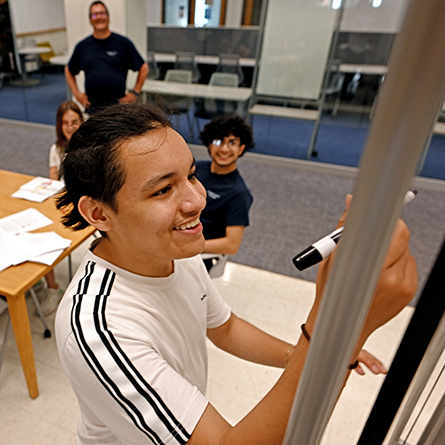
“Migration Crisis in Europe” fall film series
A series of five international films that explore the predicaments of the European refugee crisis, in English or with English subtitles as indicated, will be shown at 7 p.m. in Bill Hall 106, Silfen Auditorium, on the dates below. Screenings are free and open to the public and are followed by a discussion.
The film series is an integral part of “Migration Crisis in Europe,” an anthropology course being taught this fall by professor Catherine Benoit, who will offer comments following the screenings. The course discusses the current migrant situation in the context of the global reinforcement of borders through the development of walls and camps in and on the outskirts of "Fortress Europe" and looks at the development of "sanctuary cities" across Europe.
Note: Bill Hall is located in the south area of campus and visitors are encouraged to park in the South Parking Lot or close to Cummings Arts Center.
Wednesday, Sept. 6
“Stopover” (L’escale) by Kaveh Bakhtiari, 2013, 100 min.
Genre: Documentary. French-Swiss co-production.
Filmed in Greece.
Languages: Farsi, Greek, English, with English subtitles.
In Athens, Amir, an Iranian immigrant, has a very modest flat which has become a place of transit for migrants who, just like him, chose to leave their country. But Greece is only a stopover, all of them hoping to reach other Western countries. They find themselves stuck at Amir’s, waiting for ID documents, contacts, and the smuggler to whom they might entrust their destiny. Of Iranian origin himself, Bakhtiari stayed one year in the flat with the film’s characters, in total secrecy, smuggling the footage every month to Switzerland. “Stopover” is Bakhtiari’s first feature-length documentary. In addition to premiering at Festival de Cannes (Quinzaine des réalisateurs), it was featured in over 20 festivals around the globe. It also won the Special Jury Prize at the International Francophone Film in Namur, the Critic’s Prize at New Cinema Festival in Montreal and the Colombe d’Or New Talent Prize at DOK International Festival in Leipzig.
Wednesday, Sept. 20
“The Land Between” by David Fedele, 2014, 108 min.
Language: in English
“The Land Between” offers an intimate insight into the hidden and desperate lives of Sub-Saharan African migrants living in the mountains of northern Morocco. For most, their dream is to enter Europe by jumping a highly-militarised barrier into Melilla, a Spanish enclave on the African continent. With unique and unprecedented access, this film documents the everyday life of these migrants trapped in limbo, as well as the extreme violence and constant mistreatment they face from both the Moroccan and Spanish authorities. It also explores many universal questions, including how and why people are prepared to risk everything, including their lives, to leave their country, their family and friends, in search of a new and better life.
Wednesday, Oct. 18
“Welcome to Refugeestan” (“Bienvenue au Réfugistan”) by Anne Poiret, 2016, 71 mins.
Genre: TV Investigative Documentary. French Production. Filmed in: Tanzania, Jordan, Greece, Kenya, Switzerland, France.
Languages: French, Arabic and more, with English subtitles.
Almost 17 million people - refugees, displaced persons or migrants - live in camps, in a virtual country the size of the Netherlands. Yet the names of these places do not appear on any maps. The UNHCR and NGOs have developed ways of running them that are both efficient and absurd. This film explores the land of camps, from Kenya, to Tanzania, Jordan, and the Greece-Macedonia border, as well as at the UNHCR’s headquarters in Geneva.
Wednesday, Nov. 1
“Border,” by Laura Waddington, 2004, 24 mins.
Genre: video art. French / English co-production. Filmed in France.
Language: English.
In 2002, Laura Waddington spent months in the fields around Sangatte Red Cross camp in France with Afghan and Iraqi refugees, who were trying to cross the channel tunnel to England. Filmed at night with a small video camera, the figures lit only by the distant car headlights on the motorways, “Border” is a personal account of the refugees' plight and the police violence that followed the camp's closure. Laura Waddington made this video at a time when few European directors and artists were working on the subject. “Border” opened at Locarno Festival, won awards at Oberhausen, Pantin and Zürich festivals, and is now part of the collections of major museums and universities.
Wednesday, Nov. 8
“After Spring” by Steph Ching and Ellen Martinez, 2016, 102 mins.
Language: English
With the Syrian conflict now in its seventh year, millions of people continue to be displaced. “After Spring” is the story of what happens next. By following two refugee families in transition and aid workers fighting to keep the camp running, viewers will experience what it is like to live in Zaatari, the largest camp for Syrian refugees. With no end in sight for the conflict or this refugee crisis, everyone must decide if they can rebuild their lives in a place that was never meant to be permanent.
For more information, contact Catherine Benoit, cben@conncoll.edu.
September 7, 2017
